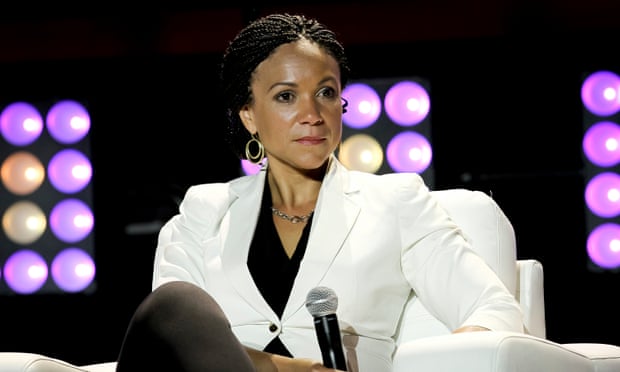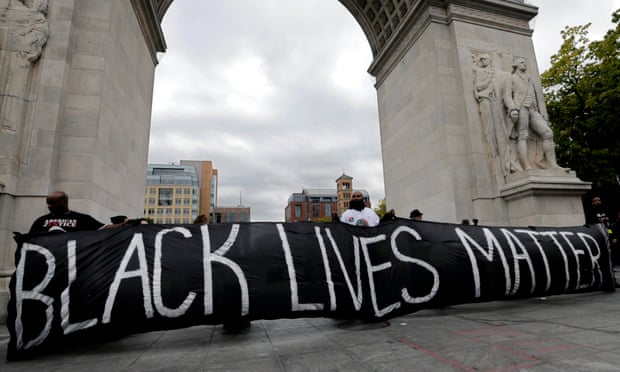Former contributors and friends of the show worry that marginalized voices are being tuned down and issues important to many Americans ignored.
By Rose Hackman
The Guardian, March 3, 2016 —

Melissa Harris-Perry in 2014. Photograph: Donald Traill/Invision/AP
Days after the cancellation of Melissa Harris-Perry’s show, a vast array of former guests, speakers and intellectuals remain aghast at the news.
In an email to staff last Friday, Harris-Perry wrote that the show had been “taken” from her and staff by senior management in the middle of an electoral season. No longer holding editorial control, she decried the de-facto “disappearance of our show and our voice”. Severance of ties between Harris-Perry and the network have since been confirmed by MSNBC.
“It was the only place on cable news that hosted intelligent discussions about politics and culture with the multitude of voices those conversations require,” said author Mychal Denzel Smith.
Others intellectuals agreed, worried that the show’s cancellation is a sign mainstream news will no longer make space for them in a post-Obama world.
“What Melissa was able to bring to the fore was a really rich and diverse black intellectual class that forever has been our secret,” Dream Hampton, a culture critic, film-maker and writer, told the Guardian.
Guests were by no means all black. It was more that they were not all white, not all male, and not all gender-conforming. Harris-Perry redefined what news makers could look like, and convincingly illustrated that understanding a developing news story need not entail being subjected to a white male translation of it. In fact, she arguably illustrated the opposite.
Cherrell Brown, a young activist who boasts a following of tens of thousands online and frequently appeared on the show, says Harris-Perry gave her space to be “unapologetically black”. Her thoughts were echoed by Janet Mock, a New York Times bestselling author and trans rights advocate, who says Harris-Perry and her team created platforms for a whole range of new and relevant people. “She really brought the authorities of the internet and social media to television. Her show became a first gateway for people to talk about their issues on a mainstream platform.”
For four years, Harris-Perry facilitated discussions on everything from the long and complicated history of mass incarceration to the gendered and racialized politics of climate change, toys or even sneakers, throwing together community members with leading academics, organizers, bloggers and journalists. All rubbed shoulders on an equal footing, and at the center of these debates stood one group that is arguably one of the most marginalized and ignored in American society: black women.
The Melissa Harris-Perry show stood in stark contrast to other news weekend shows, all heavily dominated by white men. As such, it was revealing of how “monochromatic and narrow” currently accepted media perspectives are, said Jamil Smith, a former producer on the show and now senior national correspondent with MTV News.
[Click on the four arrows (above right) to read the report.]
Only a quarter of guests on the show were white men, according to a 2014 study by Media Matters – a proportion much more reflective of actual US demographics. It became a symbol of what the media world referred to as the “Obama electorate”: a population of Americans that was increasingly progressive, diverse and proved its power by electing the first black US president.
Keeping a finger on that pulse meant that Harris-Perry was one of the first to report on issues which sparked grassroots upheaval and changes in the national conversation.
Jelani Cobb, a University of Connecticut professor and writer for the New Yorker, remembers being on the 2013 show right after George Zimmerman was found not guilty for shooting to death young black teenager Trayvon Martin as he walked home carrying a can of soda and skittles.
“We had this inchoate despair that was very prevalent among African Americans and we needed a forum where we could discuss that. Our analysis needed to be happening in terms of what was happening with racism in this country,” Cobb says.
The ruling and ensuing protests laid the ground for the creation of a larger Black Lives Matter movement that brought issues of longstanding, unpunished state sanctioned violence against African Americans to the fore – outrage that reached a crescendo one year later with the news of the fatal shooting of Michael Brown, another unarmed black teenager.

A ‘Black Lives Matter’ protest in New York. Photograph: Peter Foley/EPA
Alicia Garza, an organizer with the National Domestic Workers Alliance and Black Lives Matter and a frequent guest, says that the show “understood that the vision and organizing of Black Lives Matter was much more than a hashtag, but instead was a vision for a new society”.
There is explicit worry among former contributors and friends of the show that marginalized voices are not just being tuned back down, but issues at the heart of many Americans’ minds and hearts are being shovelled back into silent corners.
“It is really hard for me in this moment to separate it [the show’s ending] from the rise of Donald Trump and the notion of white backlash, in which a lot of white Americans feel like they have lost their country,” explains Dorian Warren, a political scientist, presenter and political consultant who sometimes took the helm of Harris-Perry’s show.
“White backlash is what we always see in this country whenever there is perceivably a step or two forward for black people,” Warren adds, referring to the election of Barack Obama and the ensuing rush to treat blackness in the multiplicity of its manifestation as a more important part of mainstream conversations.
Was a Melissa Harris-Perry only possible in a world that temporarily believed electing a black president had signalled positive, healing changes?
The strategic use of media-uplifted racism by Trump, combined with the definite return to a white presidency, may be paving the way for media executives keen to capture a current national mood.
Khalil Gibran Muhammad, director of the Schomburg Center, says intolerant discourse on the right is in many ways “a reaction to what Melissa’s show in itself represented, which was the emergence and the rise of a significant black and brown public sphere”.
Many of Harris-Perry’s other colleagues of color appear to have been purged from the network, too.
“It seems there’s a wave of whitewashing in media that is happening as the Obama presidency comes to a close. As if the value of black journalists, academics, activists, and thinkers was tethered to the existence of a black president. I hope I’m proven wrong,” Mychal Denzel Smith says.
www.theguardian.com/world/2016/mar/03/why-melissa-harris-perry-msnbc-show-mattered








